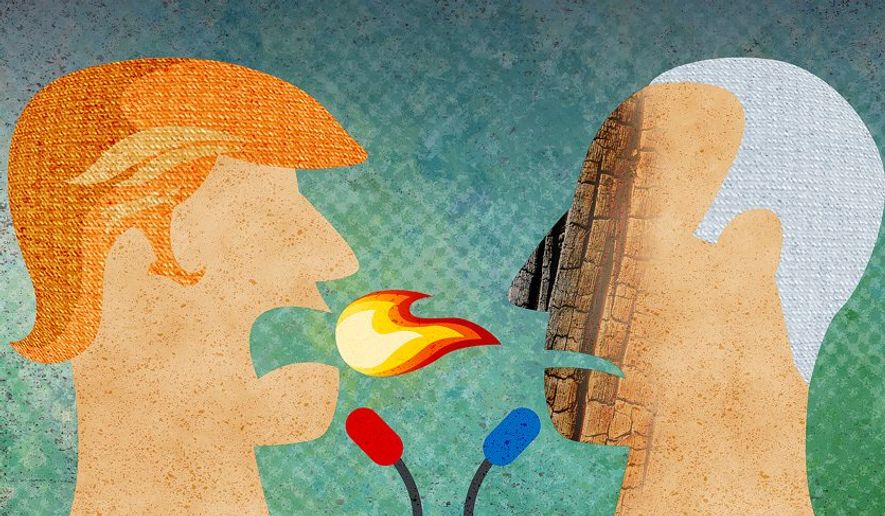OPINION:
National Democratic leaders seem to realize instinctively that as long as the November presidential election can be characterized as a referendum on President Trump’s rhetoric and style, they have a good chance of sending him packing, but if the contest morphs into a race in which voters begin to focus on the relative capabilities, issues and positions of the two candidates side by side, things could go south on them fairly quickly.
Recent polling reflects the sort of race Democrats want because they are based on a public perception of former Vice President Joe Biden as able, experienced and non-threatening. Mr. Biden may be the luckiest guy alive. Without the rough and tumble of a normal presidential campaign, voters have not been able to test their perception — and many Democrats hope the 2020 campaign will end as it has begun. They want the former vice president to stay in his basement while surrogates stoke opposition to Mr. Trump rather than generating support for their candidate.
Mr. Biden on paper and in isolation may seem like a strong candidate. If he gets loose and has to face either an inquiring press or public to say nothing of facing Donald Trump, he could easily blow his current lead and possibly the election itself. That’s why when the Fox News Channel’s Chris Wallace invited Mr. Biden to sit for a one-on-one interview recently, he was informed that wouldn’t be possible, even though the president had already both weathered and survived Mr. Wallace’s tough questioning.
And it’s why Mr. Biden’s allies are scrambling to find some way to avoid putting him on the same stage with the president for a debate. Their real fear is that their candidate won’t be able to handle an unscripted confrontation or answer the tough questions from the moderators and the president. They know he will be criticized for refusing to debate and that doing so will stoke rumors that their candidate is slipping mentally, but they’re apparently willing to risk that rather than the fallout from a truly dismal performance.
Since the 1960 Kennedy/Nixon debate, presidential debates have become an expected part of the campaign season because they give voters an opportunity chance to essentially look the candidates in the eye and compare their abilities in a way that isn’t otherwise possible. Leading liberal and progressive pundits are preparing the groundwork for the Biden Team to bail on the debates by arguing that such debates are no longer important.
Earlier this week, for example, Elizabeth Drew, who has covered presidential campaigns for decades, suggested in a New York Times op-ed that we “scrap the presidential debates,” while former Clinton press secretary Joe Lockhart advised the Biden campaign on CNN that “whatever you do, don’t debate Trump.” Meanwhile, Bill Kristol, a leading Never Trump leader was tweeting that “the fairest thing might be to skip the debates this year.”
If Mr. Biden does back out of the debates, it will be for only one reason: He and his team are afraid, very afraid of what the American voter might see if he and Mr. Trump appear together. Debates can and sometimes do make a real difference.
The first ever nationally broadcast debate took place during the run-up to the 1948 Republican Oregon presidential primary pitting Harold Stassen against Tom Dewey. It’s hard to believe today, but Stassen, the “Boy Governor” of Minnesota, had emerged seemingly from nowhere that year. He won a series of primaries and was on the verge of taking the nomination from Dewey when the former prosecutor and New York governor challenged him to a radio debate days before the then-vitally important Oregon primary.
Stassen asked Dr. Walter Judd, the dean of Minnesota’s congressional delegation, whether he should accept the challenge. As Judd related the story to me some years before his death, he told Stassen that it was his decision, but that he might consider that Dewey’s successful prosecutorial career meant he knew how to argue to a jury.
Stassen threw caution to the winds and accepted the challenge. Judd was a guest with Stassen’s wife at the Weyerhaeuser Residence in Minnesota the evening of the debate heard by more than 40 million people. After dinner, everyone sat in the parlor around a radio. About 10 minutes into the debate, according to Judd, Mrs. Stassen got up, turned off the radio and silently went up to bed. She knew way back then that debates can matter and that it was all over.
Before the debate, the “Boy Governor,” according to the polls of the day, had a healthy lead, but he lost the debate, his lead and his party’s nomination that night.
It was the first time a nationally broadcast debate made a difference, and there have been many since. There may be another looming, if Mr. Biden comes out of his basement to face his opponent on a stage in front of the television cameras and millions of voters.
• David A. Keene is an editor at large for The Washington Times.




Please read our comment policy before commenting.